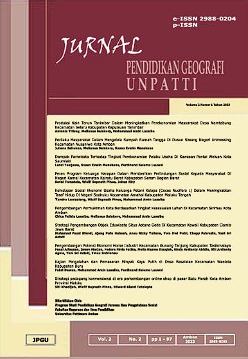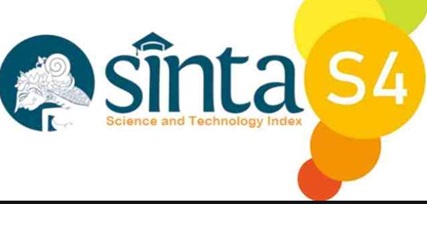Study of Factors Causing Damage to Coral Reef Ecosystems in the Coastal Area of Negeri Assilulu Beach, Leihitu District, Central Maluku Regency
Kajian Faktor Faktor Penyebab Kerusakan Ekosistem Terumbu Karang Pada Wilayah Pesisir Pantai Negeri Assilulu Kecamatan Leihitu Kabupaten Maluku Tengah
Abstract
Study of the factors causing damage to coral reef ecosystems in the coastal areas of Assilulu State, Leihitu sub-district, Central Maluku regency. Based on the results of initial research, information was found that the people of Assilulu often throw rubbish or waste into the sea, carrying out destructive fishing, coastal development, and coral mining. This research aims to examine the conditions and factors causing damage to coral reefs in the coastal areas of Assilulu State. This research uses a quantitative descriptive method. Data collection techniques in this research were observation, interviews, documentation, coral reef data samples, a population of 25 people, and questionnaires. The data analysis techniques used in this research are data collection, reduction, presentation, and conclusion. The results of this research show that the factors causing damage to coral reef ecosystems in the coastal areas of Assilulu State include two factors, namely natural factors (non-anthropogenic), including temperature, brightness, and coral predators, and human factors (anthropogenic), among others. : dumping marine waste, using destructive fishing gear, mining coral to make building materials and shellfish for consumption, and carrying out marine tourism activities, which are factors that cause damage to coral reef ecosystems, namely the result of human factors, namely 80.98% when compared with natural factors, namely 58.09%. The percentage of coral reef cover ranged between 23.33% at transect location 1, 33.33% at transect location 2, and 26.67%. at transect location 3. According to the Ministry of Environment number 4 of 2001, the percentage of live coral cover is in people with low incomes in the moderate category.
Downloads
References
Leuwol, F. S., Salampessy, M., & Dewi, W. A. (2023). Analysis of the Application of WFH Policies in Overcoming Pollution Problems in Jakarta. Riwayat: Educational Journal of History and Humanities, 6(3), 1400–1404. https://doi.org/https://doi.org/10.2481 5/jr.v6i3.33939
Kasim, Faizal. 2011. “Pelestarian Terumbu Karang Untuk Pembangunan Kelautan Daerah Berkelanjutan.” (November): 1–7.
Nufus, Hayatun, and Zuriat Zuriat. 2020. “Sosialisasi Dampak Pencemaran Plastik Terhadap Biota Laut Kepada Masyarakat Di Pantai Lhok Bubon Aceh Barat.” Jurnal Marine Kreatif 3(2): 7–13.
Sala, Ridwan, Tresia Tururaja, Jurusan Ilmu Kelautan, and Universitas Negeri Papua. 2011. “No Title.” 7(1): 35–42.
Sihasale, Daniel A. 2013. “Keanekaragaman Hayati Di Kawasan Pantai Kota Ambon Dan Konsekuensi Untuk Pengembangan Pariwisata Pesisir.” Journal of Indonesian Tourism and Development Studies 1(1): 20–27.
Syam, Aisil. 2012. “Tutupan Dan Kondisi Terumbu Karang Pada Beberapa Lokasi Daerah Perlindungan Laut Coremap Ii Kabupaten Biak-Numfor.” Skripsi.
Zurba, Nabil. 2019. “Pengenalan Terumbu Karang Sebagai Pondasi Utama Laut Kita.” Unimal Press: 128.














